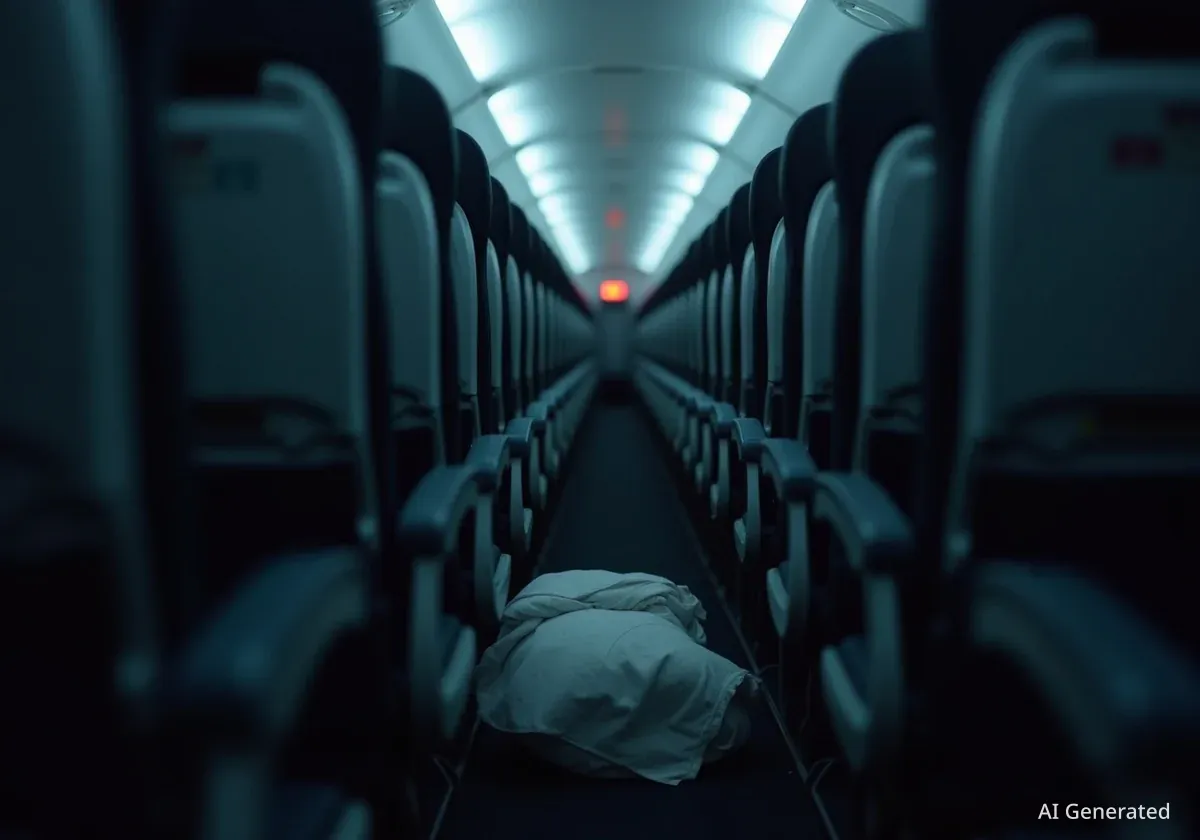A federal jury in San Jose has ordered American Airlines to pay $9.6 million to a California chef who suffered two strokes during an international flight in 2021. The jury found that airline employees failed to follow company protocols for assisting an ailing passenger, leading to a significant delay in medical care.
Key Takeaways
- A jury awarded $9.6 million to a passenger after American Airlines employees did not follow medical protocols.
- The passenger, Jesus Plasencia, suffered two strokes during an international flight in November 2021.
- Airline crew allegedly failed to alert medical personnel and did not divert the flight.
- The delay in care lasted nearly eight hours, potentially worsening the passenger's outcome.
- American Airlines stated disagreement with the verdict and is evaluating next steps.
Jury Finds Protocol Failure Led to Delayed Care
The verdict, delivered on Thursday, September 23, 2025, concluded a lawsuit filed by Jesus Plasencia, a chef from Watsonville, California, and his wife, Ana Maria Marcela Tavantzis. The complaint alleged that American Airlines crew members did not adhere to established procedures when Plasencia experienced medical emergencies.
According to court documents, Plasencia, who was 67 years old at the time, was traveling with his wife from Miami to Madrid in November 2021. The flight was an American Airlines international service.
First Stroke Occurred at the Gate
While the aircraft was still at the gate in Miami, Plasencia experienced a "mini stroke." During this event, he temporarily lost his ability to speak and could not pick up his phone. His wife immediately informed a flight attendant and the pilot about his condition.
The lawsuit claimed that instead of contacting medical personnel and following company policy for such incidents, the pilot dismissed the wife's concerns. The pilot reportedly "joked with Plasencia" before clearing the flight for takeoff.
Key Facts
- Passenger Age: 67 years old at time of incident
- Flight Route: Miami to Madrid
- Incident Date: November 2021
- Award Amount: $9.6 million
Second Stroke During Flight, Eight-Hour Delay
After the plane departed and was in the air, Plasencia suffered a second, more severe stroke. The flight continued for approximately eight hours without diversion. The complaint filed in 2023 stated that the flight crew asked other passengers to monitor Plasencia during this time. However, the pilot was not informed about the in-flight medical emergency, preventing a potential diversion.
Upon landing in Spain, Plasencia was hospitalized. He remained in critical condition for more than three weeks before he could return to the United States. His current condition prevents him from speaking or writing. He now requires "daily, significant, around-the-clock, in-home care and intensive rehabilitation," according to the lawsuit.
“It is shocking that American Airlines responded so poorly to a medical emergency like this,” said Darren Nicholson of Burns Charest, who represented the couple in the lawsuit. He emphasized that the airline did not follow stroke protocol, which requires immediate medical assistance and aircraft diversion.
Legal Basis and Airline Response
The jury found American Airlines liable under the Montreal Convention. This international treaty governs international air travel and sets rules for airline liability in cases of passenger injury or death.
The couple argued that the airline's failure to follow protocols delayed Plasencia's access to critical medical care by nearly eight hours. They contended that earlier intervention could have led to a better health outcome for him.
Understanding the Montreal Convention
The Montreal Convention is a multilateral treaty adopted in 1999. It standardizes rules for international carriage by air, including liability for passenger injury or death, damage to baggage, and delays. It helps ensure passengers receive fair compensation and clear legal frameworks when incidents occur during international flights.
In response to the verdict, American Airlines issued a statement. The airline affirmed its commitment to passenger safety and well-being.
“The safety and well-being of our passengers is our highest priority," American Airlines said. "While we respect the jury’s decision, we disagree with the verdict and are currently evaluating next steps.”
This statement indicates that American Airlines may consider further legal actions, such as an appeal, as it evaluates the outcome of the trial.
Impact on Passenger Care and Airline Procedures
This jury decision highlights the importance of airline adherence to medical emergency protocols. Airlines have established guidelines to address passenger health crises during flights. These protocols are designed to ensure passengers receive timely and appropriate medical attention.
The case underscores the potential consequences when these procedures are not followed. Delays in medical care, especially for conditions like strokes, can have severe and lasting health impacts on individuals.
Future Implications for Air Travel
Airlines regularly train their staff, including pilots and flight attendants, on how to handle various in-flight emergencies. This includes medical situations. The outcome of this trial may prompt airlines to review and reinforce their training programs and internal policies.
Passengers rely on airline crews to manage unexpected health issues effectively. Cases like this draw attention to the critical role flight personnel play in ensuring passenger safety beyond routine service. The legal findings serve as a reminder of the responsibilities airlines hold under international agreements like the Montreal Convention.
Stroke Statistics
- Speed of care matters: For every minute a stroke goes untreated, approximately 1.9 million brain cells die.
- Long-term effects: Strokes can lead to permanent disability, including speech loss, paralysis, and cognitive impairment.
The legal team for Mr. Plasencia and his wife emphasized that the airline's failure to divert the flight was a key factor in the delayed care. They argued that proper protocol would have ensured immediate medical intervention, which is crucial for stroke victims.
The American Airlines statement indicates the company's intention to assess its options. The resolution of this case could have broader implications for how airlines manage medical emergencies on international flights and how they are held accountable under international law.





